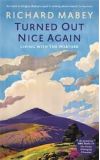
10 Mar 2013 04:00:15
Will we ever be able to defeat the weather? Richard Mabey, our greatest nature writer, thinks not. When he hears of possible technological fixes for climate change – the idea that giant parasols could be sent into space to shield us from the sun, or that the ocean be sown with iron to promote the growth of plankton which would then soak up the atmospheric carbon dioxide – he sees only hubris, which is exactly what got us into the current crisis in the first place. But in any case, anxieties about global warming aside, most of us would not want to change it even if we could. As he points out in his gusty and brilliant new book, when it comes to the weather, the British swing between "sulky resentment and playful derring-do". The local council is always about to run out of grit, and our boiler is definitely jinxed, but come the first snowfall "we are out playing truant with the toboggans". You don't need to have read John Ruskin on the pathetic fallacy to know that we make the weather "the stuff of nostalgia and dreads", and that if it were always warm, the blue skies and the sunshine would soon seem just as cruel as the rain and the cold.
Turned Out Nice Again, which began its life as The Essay on Radio 3, is very short; its hardback incarnation is about the size of a large bar of Kendal mint cake. I don't mean this as a criticism. Mabey, still best known as the author of Food for Free, has always been an inordinately precise writer: this is the superpower that enables him to make thoroughwort look beautiful, and knotgrass seem positively numinous (his last book, you will recall, was all about weeds). Here, though, his concision comes into its own, Thomas Hill of the flatulent lentils somehow contriving to sun himself beside Gilbert White, the 18th-century naturalist who was infatuated with melons; William Wordsworth, skater extraordinaire, nestling for warmth next to JMW Turner, fog obsessive. You could read a book 10 times as long, and learn from it an awful lot less.
It fairly bulges with facts, some of them oddly unnerving. Who knew that the summer of 1975 was every bit as sweltering as that of 1976? (According to Mabey, we cleave to the idea of 1976 as the hotter because it was "accompanied, mordanted, by a drought".) But the most beautiful sections of the book – and they really are exquisite – are memoir. The right weather at the right moment feels like a benediction; this is what turns ordinary, easy-to-forget days into halcyon days. In the 1980s, wandering a beech wood, Mabey was caught in a downpour so ferocious, it liquefied the decaying trunk of a tree right in front of his eyes: "The rain was hammering drills of water at the already rotting trunk, and flakes of bark, fungal ooze, barbecued dregs from the lightning-charred heartwood began to drip on to the woodland floor like thick arboreal soup." It sounds terrifying but, in fact, it soothed him, the melancholy he had felt at the sight of a fallen bough swiftly replaced with a sense of "what felt like the beginning of something new".
Mabey has spent his life on the trail of "weather phantoms", and thanks to this, Turned Out Nice Again is replete with such wonders: a Cornish wood that is tidal at the spring equinox, primroses temporarily flowering under the sea; a cave rainbow that flips over on its side to form a circle with a neighbour, the two surrounding him at chest level "like a fallen halo". But there are more ordinary delights here, too: a couple of children using the huge, rhubarb-like leaves of butterbur as umbrellas; a fledgling kingfisher that whirls by his boat on the Norfolk Broads and makes the day feel sunny even though it is not at all (for Mabey, a passing kingfisher is "a flash of fair-weather lightning"). He is not a winter man; as a depressive, its dinge makes him torpid and morose. But this doesn't mean that he doesn't thrill at the sight of a skater hissing across a frozen pond. As he looks on, the mud beneath his feet scrunches enjoyably "like creme brulee".
The British are, by general agreement, uniquely preoccupied with the weather. The question is: why? The temperature has only exceeded 100 degrees three times in the last hundred years. The heaviest rainfall in a single day was 11 inches in Martinstown, Dorset, on 18 July 1955 – which is a lot, but hardly a monsoon. Our climate, once you tear yourself away from your latest gas bill and stop to think about it, is really rather mellow. Mabey puts our obsession down to its whimsicality. We live on an island in the middle of the Atlantic storm belt, just offshore from a huge landmass, and thanks to this "our meteorological lot is messy and erratic, whether we like it or not". We haven't any idea what to expect, and it's this that causes us to rage at the wrong sort of snow on the line even as we swoon at the sight of a hoar frost. In other words, the flipside of benediction is effrontery. How Mabey has managed to convey so elegantly the strange coexistence of both these things – and so much else besides – in 90 scant pages is a mystery to me: a miracle on a par with a moonbow or sunshine breaking through thick fog. But given that I haven't seen the sun for several weeks now, it's cheering beyond words that he has. "There is really no such thing as bad weather," said Ruskin. "Only different kinds of good weather." Read Mabey, and you can almost believe the great man was right.

